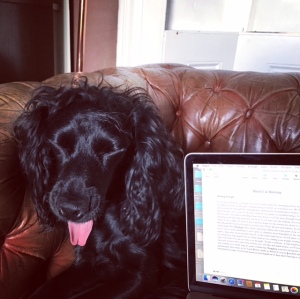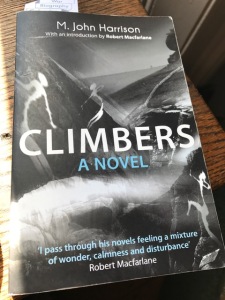Today’s blog post is about a prickly, awkward subject for writers: dealing with criticism. As a poet, I like to think I’m fairly adept at assimilating feedback from poetry peers and editors. I’m not particularly precious about my poems, but I also have a strong sense of my own aims and intentions as a writer. But things have changed since I dipped my toes into the murky waters of prose.

This year, I decided to spend my annual leave finishing a novel I began four years ago. As fate would have it, the novel-writing spell happened to coincide with some dog-sitting I’ve been doing in Sheffield, so I’ve had canine companions while I’ve been tearing my hair out (NB. that doesn’t work well if you have a buzzcut).
I began my novel Black Car Burning in 2013 and worked on it sporadically over the next few years before plucking up the courage to show it to my agent, who was positive and constructive in his feedback. After some redrafting, we sent it to my editors and I then began another round of very useful re-writing and reframing based on their thoughts. Last year, I finally signed a contract to publish the novel. But because work, poetry, readings and life intervened, I haven’t had chance to revisit the novel and some further editorial suggestions since then.
Here’s what two weeks in the life of a writer trying to edit a first novel look like:
***
DAY 1: Re-read M. John Harrison’s Climbers for the fifth time. Quote sections aloud to spaniel, whippet and beagador who stare back quizzically. Say ‘Bob Almanac looked like an ageing butcher’s boy’ and ‘it takes faith to penetrate the world the way a cormorant must’ and ‘his breath going in and out like coal being shovelled’. Feel unbridled joy at the book’s allusive concision. Remember why writing a novel felt urgent. Remember why I should probably give up, being no M. John Harrison myself. Open laptop. Close laptop. Go to Kelham Island pubs with Bob instead.

DAY 2: Wake up. Regret final pint in company of strange government conspiracy theorist from Park Hill. Sit down with feedback from trusted editor. How bad can it be? Oh. She likes it, apart from two major plot lines, half the characters, the staccato prose style, the structure and all the stuff about climbing. Weep melodramatic tears tinged with Abbeydale Moonshine. Feel stupid. Re-read feedback. Feel stupid and misunderstood. Eat ice cream. Sit in lukewarm bath. Doubt ability to write. Spend evening watching the worst of 4OD: Made in Chelsea (in Ibiza) and that programme where contenstants decide who they want to date by staring at an array of genitals. Doubt entire purpose of life.
DAY 3: Try to write. Walk dogs instead. Get dragged down hill by dogs. Hurry past mocking drinkers outside local pub. Try to write. Throw tennis ball to dogs. Stop largest dog running off with drain cover. Stop smallest dog killing frogs in garden. Try to write. Cuddle dogs on sofa.

DAY 4: Re-read Climbers again. Think about what I wanted my novel to achieve in the first place. Consider what I’m not prepared to sacrifice. Begin adding sections instead, changing the emphasis of the book. Consider which editorial suggestions I can respond to positively.
DAY 5: Pull self together. Write. Prevent dogs from tearing rug apart. Write.
DAY 6: See above.
DAY 7: Rekindle unwise affair with caffeine.
DAY 8: Edit. Cut. Edit. Write. Cut. Intervene when largest dog tries to eat packet of antibacterial hand wipes.
DAY 9: See above.
DAY 10: Rekindle unwise affair with wine.
DAY 11: Read Reservoir 13 by Jon McGregor and feel inspired by innovative approach to cataloguing village life.
DAY 12: Write. Shuffle chapters around. Murder darlings. Suffer whiplash from largest dog in Meersbrook Park. Write. Read. Write better.
DAY 13: Edit chapter by chapter. Pace around, confusing dogs. Look back and new work. Realise all is not lost. Realise novel is imperfect but mine, something only I could have written. Decide that will have to be enough.
***
You get the idea…. While I was struggling to respond to editorial criticism and suggestions last week, I received two excellent pieces of advice from friends which helped to turn things around. They are as follows:
- Remember that honest, detailed criticism is hard to come by and it is a mark of someone’s respect for you if you receive it. Never take that sort of criticism for granted. That doesn’t mean you aren’t allowed to wallow in self-pity for a while, but then you need to get a grip.
- Don’t throw the baby out with the bathwater. Very often, even an experienced editor may have identified problems in your writing but not the best solutions to those problems. Respond to feedback in your own way, incorporate changes you can live with.
To those I might add: put the snoring dog in another room. Happy writing, folks!

Hahaha! Made me laugh out loud, in recognition about accepting criticism for short fiction writing, if not the dogs (have to use cat as feedback when human editor/writing buddy not available). All very well put, Helen. All the best for progress on your novel which I look forward to reading. Moira Garland @moiragauthor
LikeLike